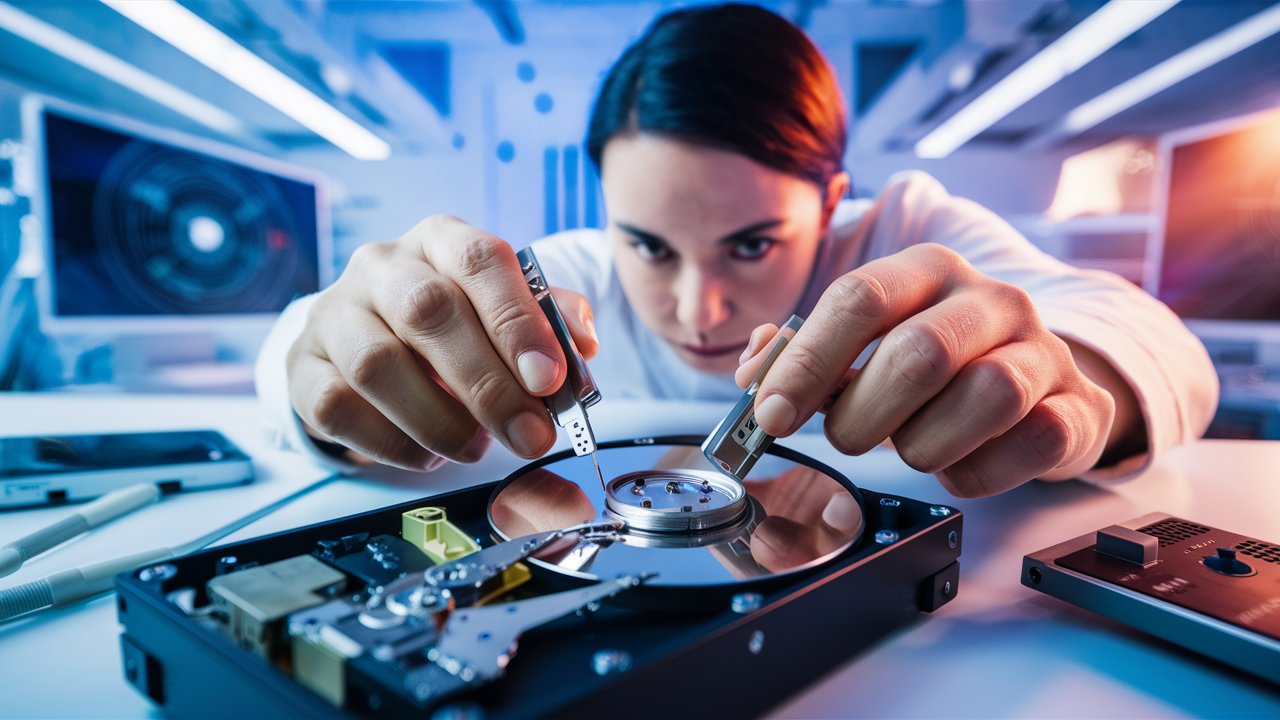Intro
In today's digital age, our hard drives store a plethora of important information, from personal photos to work documents. However, what happens when your hard drive fails? Hard drive failure can be a nightmare, resulting in the loss of valuable data. It is crucial to recognize the signs of hard drive failure and understand the common causes of physical damage to prevent data loss. In this blog post, we will discuss an effective way to identify physical damage and provide tips for hard drive recovery.
Recognizing the Signs of Hard Drive Failure
Paying attention to your hard drive's behavior is like keeping an ear to the ground. It tells you a lot about its health and well-being. One of the clearest signals that your hard drive might be heading towards failure is unusual noises. Think of grinding, clicking, or whirring sounds - these are your hard drive’s way of crying for help. These noises are far from normal and often signal that your hard drive is struggling.
Another red flag is a noticeable slowdown in performance. If accessing files or launching programs feels like it's taking forever, it's a sign something isn't right. Similarly, if your computer crashes more frequently than a stunt driver in an action movie, it's a strong hint that your hard drive may be failing.
Corrupted files can also be a symptom of hard drive issues. Imagine finding that your important documents or cherished photos won't open or are inexplicably damaged. It's a heart-sinking moment and a clear indication that all is not well with your hard drive.
When you start noticing these signs, it's a signal to act. Ignoring them could lead to a point where your data becomes as retrievable as a message in a bottle lost at sea. Early detection and intervention can make all the difference, saving you from the distress of losing precious data. So, keep an eye and ear out for these warning signs, and take them seriously. It could save your digital life

Understanding the Common Causes of Physical Damage
Understanding what leads to physical damage of hard drives is like learning the rules of the road before you start driving. It's about prevention and awareness. Physical harm to your hard drive can come from a handful of sources, each as damaging as the next, but fully within your power to avoid.
First off, one of the most straightforward causes of physical damage is dropping your hard drive. Just like you wouldn’t want to drop a glass vase on the floor, the same goes for your hard drive. It's not built to take a tumble and survive unscathed. The impact can jolt the internal components, leading to irreversible damage.
Then there's the enemy you can't see but certainly feel – extreme temperatures. Exposing your hard drive to too hot or too cold environments is asking for trouble. It's like leaving a chocolate bar out in the sun; eventually, it's going to melt. Similarly, hard drives have an optimal operating temperature range, and straying too far from it can lead to component failure.
Liquid spills are another common culprit. Water and electronics are a notorious mismatch for a reason. Just a few drops of liquid can short-circuit the internal components of your hard drive, leading to data loss and failure.
By staying vigilant against these common threats, you can steer clear of physical damage to your hard drive. It's about taking those extra moments to handle your device with care, keep it in a safe environment, and protect it from accidents waiting to happen. In doing so, you're not just looking after your hard The understanding of what causes physical harm to your drives; you're safeguarding your digital world.

The Best Way to Protect Your Hard Drive from Physical Damage
Shielding your hard drive from the physical damage can feel a bit like suiting up for a game – it's all about having the right protective gear.
The primary line of defense? A robust external hard drive case or sleeve. Think of it as armor for your hard drive, designed to absorb the shock from those accidental drops that can happen to anyone. These cases are not just about cushioning impacts; they also serve as a barrier against the invasion of extreme temperatures, which, as we’ve learned, are no friends to your hard drive’s health.
Location and environment play a crucial role too. Just as you wouldn’t leave your smartphone on the edge of a swimming pool, be mindful of where your hard drive rests.
High traffic areas, prone to spills or knocks, are risky zones. Elevate your hard drive to a sanctuary where spills and falls are less likely to occur.
While it’s easy to focus on the physical, let’s not forget about the environment. Avoiding exposure to harsh conditions is key. If you're moving between locations, especially in extreme weather, give your hard drive a moment to acclimate. Sudden changes in temperature can be as harmful as prolonged exposure to the elements.
Remember, the goal here isn’t just to avoid the immediate mishaps that can lead to physical damage but to foster an environment where your hard drive can operate safely for the long haul. By incorporating these strategies, you’re not just protecting a piece of hardware; you’re safeguarding the memories, work, and data that are irreplaceable.

Early Intervention Strategies for Hard Drive Recovery
When your hard drive shows signs of distress, like those unexpected crashes or the dreaded clicking sound, consider it a call to action. Jumping into early intervention could be the lifeline your data needs. First off, think about giving data recovery software a shot. This tool is like a first aid kit for your files, trying to patch things up and recover what's lost. But remember, time is of the essence. The longer you wait, the harder it becomes to revive your data.
If the situation looks grim and the software can't seem to work its magic, don't push your luck further. It's crucial to know when to hand over the reins to the professionals. Imagine trying to perform a complicated dance move without any training - you wouldn't, right? Similarly, professional data recovery services are your trained dancers, equipped with the right moves (or in this case, tools and expertise) to handle severely damaged hard drives. They've seen it all and know exactly how to navigate the intricate process of data recovery. Engaging their help can significantly boost your chances of getting back what you thought was lost.
Professional Data Recovery: When to Seek Help
Navigating the world of hard drive failures can be daunting. There comes a moment when your best efforts at home remedies fall short, signaling it's time to bring in the cavalry - professional data recovery services. Think of it as realizing you need a doctor when home medicine isn't cutting it. Professional services are equipped with sophisticated tools and deep knowledge, akin to having a specialized surgeon for data.
When is it the right time to pick up the phone or shoot an email their way? If your hard drive is physically damaged—maybe it took a fall, got drenched, or is just inexplicably non-responsive—and your attempts with data recovery software are going nowhere, that's your cue. Attempting further DIY recovery could be like walking on a sprained ankle; it might do more harm than good.
Professionals in data recovery are the masters of their domain. They have seen the worst cases and brought data back from the brink. They operate in controlled environments, much like a sterile operating room, ensuring the best chances for your data’s survival. Engaging their services might seem like a leap, but when your data is precious, they're your best shot at a successful recovery.
Remember, the goal is to retrieve what you thought was lost. When the going gets tough, these experts are your go-to resource for navigating the complex path to data recovery.

Preparing for the Worst: Backing Up Your Data
When it comes to guarding against data loss, the mantra is simple: better safe than sorry. Regular backups act as a safety net, ensuring that even if your hard drive faces its worst day, your data doesn't have to share the same fate. Think of backups as creating duplicates of your most cherished possessions. Just as you'd keep copies of important documents in a safe, backing up your files on an external hard drive or in the cloud keeps them secure, no matter what happens to your computer.
Setting up a backup routine might sound like a chore, but it’s a straightforward process. Whether you choose to manually copy your files to an external drive or set up automatic cloud backups, the peace of mind it brings is priceless. This way, if your hard drive ever waves the white flag, you're not left scrambling. Your precious memories, important work documents, and everything in between remain intact and easily retrievable. So, don't wait for disaster to strike. Make backup part of your regular digital hygiene and keep your data safe from unexpected turns.